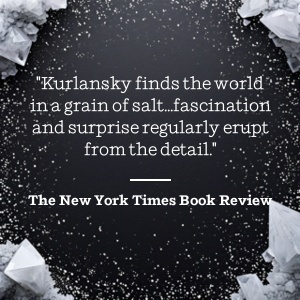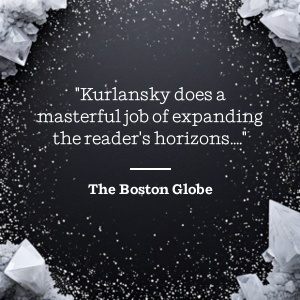Customer Services
Copyright © 2025 Desertcart Holdings Limited
Desert Online General Trading LLC
Warehouse # 7, 4th Street, Umm Ramool, Dubai, 30183, Dubai


Full description not available



A**R
Great Book about the history of salt
I am a qualified Nutritionist and Naturopath and I appreciate reading books that are rich in meaningful information. I bought this book because I had increasingly noted that the concerns we have about table salt are unfounded. So I decided to do some research. To get a good handle on salt, I needed to go back in time (hence this book) to understand the use of salt throughout history, and then relate that to more recent studies that were conducted.There were as many studies claiming salts benefits and there are many claiming salt is bad. So that did not give me any confidence that everyone was singing from the same hymn sheet. Whenever I see conflicting study outcomes, I immediately look to see whether we are comparing apples with apples, and we were not. You see, there are actually 3 types of salt and one is very good and two are not so good. Most studies did not even point this out, or realised that we humans eat three very different types of salt. So let me try to make sense of this:I have certainly come to the conclusion that many others have already come to, that the benefits of eating generous amounts of the right salt to suit one’s taste is justified, and much better than being paranoid and limiting my intake. But we need to choose the right salt. What I did learn was that ocean salt is about 85% Sodium Chloride and the remaining 15% is this wonderful suite of over 84 minerals. The thing is, the salt processors remove the 15% part which is the really valuable portion, and sell it as Magnesium Oil. Once you understand that there are three types of salt (1) pure ocean salt (2) ocean salt with the 15% minerals removed and (3) tables salt being pure sodium chloride plus added free-flowing additives and iodine, then it all become very clear. If you eat the pure 100% sea salt you can have as much as you like (of course being sensible) whilst the others (#2 & 3) should be restricted.The 'bottom line' is that many people are not getting enough salt which causes dehydration, and this insufficiency of water in the human body has all sort of consequences such as thicker blood (ie blood with high viscosity) and reduced metabolic function caused by low body fluid levels. This can have all sorts of consequences such as fatigue, increased colds and flu's, and hundreds of other ailments as the body struggles to move fluid around efficiently. The old line that salt is high in sodium and sodium increases blood pressure is a very simplistic explanation and one wonders how the population was ever duped into believing it. Years ago before we had refrigeration we would store our meats in barrels of salt and we ended up consuming a lot of salt. Whilst not suggesting we go back to those times, I would suggest that for most healthy people that 5-8 grams of salt per day for an adult is fine and will not increase blood pressure. Only those on salt-restricted diets need to concerned about limiting salt.I have written a short paper about Salt and Magnesium Oil and some readers may like to download it to help understand the benefits of salt. You can download it here: https://drive.google.com/folderview?id=0B4XGKNybHkRkb1lZT2N3VTgyXzQ&usp=sharing
S**G
too many recipes
Unlike oil, salt and water are reusable and also among the most abundant elements on earth. There is no shortage of either one to last humanity through eternity. Except without energy, we just can't make good use of them. This has been the struggle throughout human history until about 100 years ago.Mark Kurlansky's book, Salt: a World History, tells the world's history from the angle of salt and I will never view this commodity substance the same.Earth has a huge amount of salt. Coastal places clearly have sea water. Inland areas usually have salt mines, sometime as big as a mountain, or salt lakes. Then there are brine springs all around the world. To extract salt from them, we need energy: to dig, to evaporate, to distribute. Historical major saltworks were usually at the location where all three were together: free flowing brine spring, big mountain of rock salt, or long coast lines; forest, coal mine, natural gas, or good weather for solar energy; and river, canal, or sea ports. All those places became major cities which, in turn, shaped most of our history.Until canning and refrigeration, salting was the only way to preserve food: meat, fish, dairy, and vegetables. Therefore it became the element for survival. Without salt, people could not preserve food and would starve when there was no harvest or the weather turned bad. Salt also won or lost wars. Soldiers needed food to fight; food needed salt. No salt, no rations, no soldiers, no winning. Surprising number of wars were decided by the control of salt. For the US civil war, Union controlled salt better than Confederacy and eventually won.Many of my favorite foods: smoked salmon, ham, bacon, kimchi, thousand-year egg, etc. came from the old days when salting foods was an everyday business. I learned that Chinese prefer to cook with already salted ingredients: soy sauce, dou-ban, dou-shi, zai-cai, etc. instead of sprinkling salt directly. I also learned how salt makes meat tender by breaking down the protein. This explains the working of curing meat, also why brining chicken makes them tasty.With cheap energy, salt will be the easiest problem to solve. And the solution is right in front of us: nuclear. Almost all nuclear plants require cooling and what better to use than sea water? Cooling with sea water is the same as heating them up, salt just comes out of that process.I cannot say this book is a page turner and all those ancient recipes became boring at the end. It surprised me many times with fresh angles and factoids unknown to me. Salt shaped much of human histories and has been largely forgotten, just like many of those cities used to thrive with saltworks. Next time I go to ChengDu, I would have a different perspective for the city.
S**L
Who Knew?
I am drawn to non-fiction, but salt? Well, what a fascinating book! The writer did a lot of research, and has a sense of humor, too. I’ll never think of salt the same way again! I really enjoyed this book!
Trustpilot
4 days ago
2 days ago